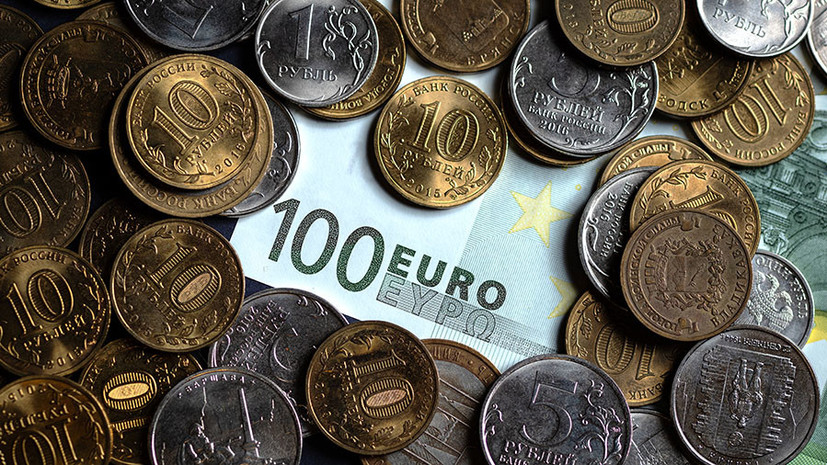On Tuesday, September 24, the Russian currency appreciably strengthens during trading on the Moscow Exchange. The euro fell by 0.33% and for the first time since July 25, fell below the psychological mark of 70 rubles. The dollar exchange rate also weakened by 0.32% to 63.61 rubles.
The official exchange rate of the Central Bank as of September 25 was 63.7 rubles per dollar and 70.02 rubles per euro.
It is noteworthy that at the auction on Tuesday, the euro at the moment reached the level of 69.92 rubles. The value has become the lowest since March 2018.
Interviewed RT experts associate record ruble-to-euro appreciation with global weakening of the single European currency against the US dollar.
The day before, the corresponding rate fell by 0.4% and was trading near the lowest level since the spring of 2017 - $ 1.09 per euro.
According to RT chief analyst at BCS Premier Anton Pokatovich, investors were worried about the weak industrial statistics in Europe. According to preliminary data, in September the business activity index (PMI) in France fell record-high over the past four months (to 50.3 points), while in Germany the figure reached the lowest level since July 2009 - 41.4 points. This is stated in the materials of the analytical agency IHS Markit.
Traditionally, the PMI index reflects the real state of a particular industry. A value above 50 points indicates a positive economic situation, below 50 points - a stagnation of the sector
“According to our estimates, the collection of such statistics reflects a slowdown in the GDP growth of Germany and France - two locomotives of the European economy. Moreover, under current conditions, there is a risk of countries slipping into a full-fledged recession, ”Anton Pokatovich, chief analyst at BCS Premier, explained in an interview with RT.
The industrial downturn in the eurozone can spread to other sectors of the region’s economy. This was announced on September 23 by the head of the European Central Bank (ECB) Mario Draghi during a speech in the European Parliament. According to him, to support economic growth, the regulator can soften its monetary policy and lower interest rates.
The actions of the ECB should lead to cheaper loans, an increase in domestic demand and an increase in investment. At the same time, the expected reduction in rates will make investment in European assets less attractive for investors and will further weaken the region’s common currency.
“Thus, the next signals of the weakness of the European economy, together with the willingness of the ECB to further mitigate monetary policy, will contribute to the weakening of the euro on the world market to other currencies,” Pokatovich emphasized.
In addition to the global depreciation of the euro, strengthening the ruble is also facilitated by the approach of the tax period in Russia. This was told in an interview with RT by the head of the Alpari information-analytical center Alexander Razuvaev. According to him, exporting companies traditionally begin to sell foreign currency and buy rubles for taxes.
According to the expert, the Bank of Russia policy also supports the Russian currency. The reduction in the key rate of the Central Bank causes an influx of investments in the country's debt securities, and as a result, the ruble begins to strengthen.
“Most likely, next year, the key rate of the Central Bank will reach 6.5% per annum. As a result, investors are more interested in buying federal loan bonds, and the demand for rubles is growing, ”Razuvaev explained.
Note that since the beginning of 2019, the Central Bank has already lowered its key rate three times - up to 7% per annum. At the same time, the government bond index (RGBI) grew by more than 8% to 145 points. According to the Moscow Exchange, the value has become the highest since March 2018.
It is curious that the ruble continues to strengthen amid a sharp drop in oil prices. During trading on the ICE exchange in London on September 24, the raw materials of the Brent benchmark fell immediately by 1.4% to $ 63.8 per barrel.
According to Anton Pokatovich, recently the national currency has become less likely to respond to fluctuations in oil prices due to the budget rule. It provides that during the growth of commodity quotes, the Ministry of Finance buys foreign currency and thereby puts pressure on the ruble. At the same time, in the event of a sharp collapse of the energy market, the Ministry of Finance stops operations, and the pressure on the ruble weakens. As a result of such actions, the dependence of the national currency on oil begins to decline.
In current conditions, the experts polled by RT predict a further gradual strengthening of the Russian currency in the coming months. According to Pokatovich’s assessment, before the end of autumn, the dollar will be in the range of 63–66 rubles, and the euro - 68.5–72.5 rubles. At the same time, Alexander Razuvayem considers it possible to reduce the dollar to 62 rubles, and the euro to 67 rubles.

